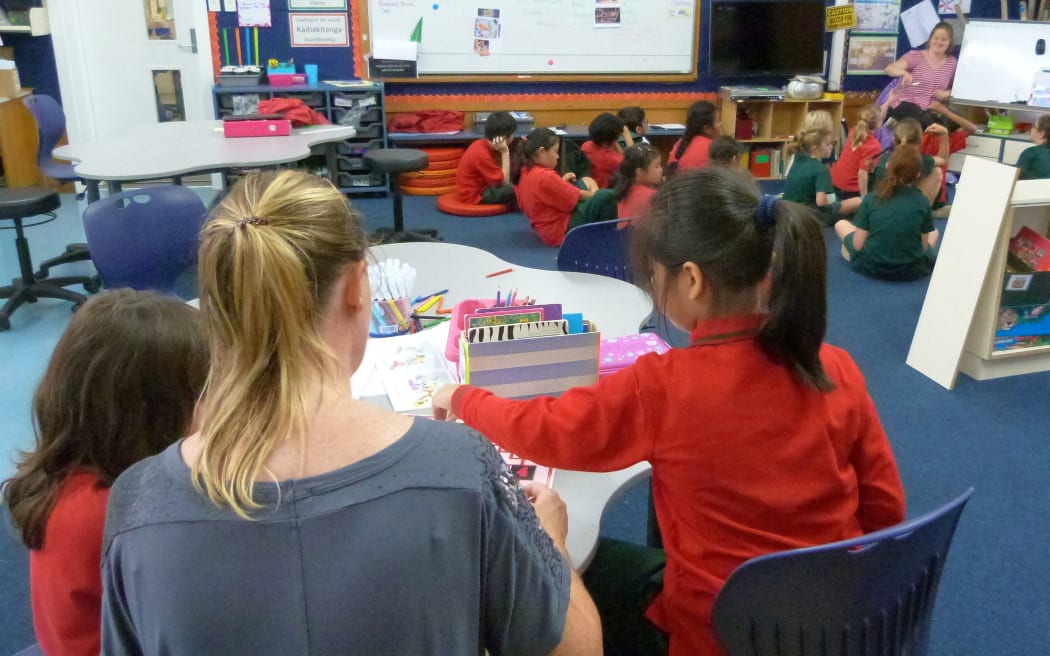Under-funding is at the heart of problems with special education, parents say, as a new report highlights problems with the system.

A teacher aide works with special education students at Newmarket School in Auckland. Photo: RNZ / John Gerritsen
The report from community law centre Youth Law said special education should be based on the rights of children rather than on rationing of resources.
It said Youth Law was receiving more complaints from families of children with special needs who were having trouble with the education system.
The report, "Challenging the Barriers: Ensuring access to education for children with special educational needs", said too many children were missing out on full access to education because schools were under-resourced and some did not want to work with disabled children and discouraged them from enrolling.
Glenis Bearsley of Palmerston North said that had been exactly the experience for her nine-year-old, who has Down syndrome and developmental dyspraxia.
"We've had experiences with being turned away with my younger son at every level of education, starting with early childhood," she said.
"When we went to have him enrolled at school we had the same problem there. The school suggested that we look somewhere else, that they didn't feel that they were set up for our son's needs."
Ms Bearsley said parents had to make a huge effort to fight for their children and some simply gave up.
"It gets to the point that parents are so exhausted that they can't fight anymore," she said.
"It's really hard for people to really understand the huge amount of pressure that is on people having to deal with the special education system.
"And the amount of effort that I have to put in to make sure that my son has a reasonable level of learning as opposed to my other three children, there's just no comparison and it should not be like that."
The parent of a seven-year-old with autism, Andrea Matheson, also endorsed Youth Law's report.
She said her son received support through the Ongoing Resourcing Scheme (ORS) because he had high needs, but he only attended school for the 20 hours a week he had a teacher aide.
"I actually pick him up from school at one o'clock every day," she said.
"He's still not funded for all of those hours, the school needs to pay the difference and if he was going full-time they'd have to pay even more and that money is just not there."
Ms Matheson said schools needed more resourcing so they could fully include children with disabilities.
"There's just not enough funding to go around. There's not enough funding for the ORS-funded children and of course there's even less for the children who don't have those needs that are quite as high."
Ministry acknowledges special ed problems
Education Ministry head of special education David Wales said the ministry knew there were problems but improvements from its update of special education would start next year.
"We know that we can do better for a lot of these kids and that's really what the update is about," he said.
"The update really commits us in the ministry to getting things right and getting things better for these kids."
Youth Law's report said New Zealand was breaking international law because it did not have legislation ensuring disabled children had an enforceable right to a full education.
Mr Wales said that right already existed through the Education Act, though the ministry preferred to work with schools to show them how they could include children with special needs.
"The legislation does give us the stick that we need, we're able to direct schools when required to take children and we can go further than that, but it's always best to try and work with the family and with the schools to accommodate these kids."
Mr Wales said in extreme cases the ministry had the power to appoint a limited statutory manager or a commissioner to schools that resisted enrolling children.
But Disability Rights Commissioner Paul Gibson said a right to inclusive education, including reasonable accommodation of a child's needs, were important recommendations that the ministry should seriously consider.
"A failure to incorporate inclusive education principles at both legislative and operational levels will only see the risks and barriers for disabled children increase," he said.






